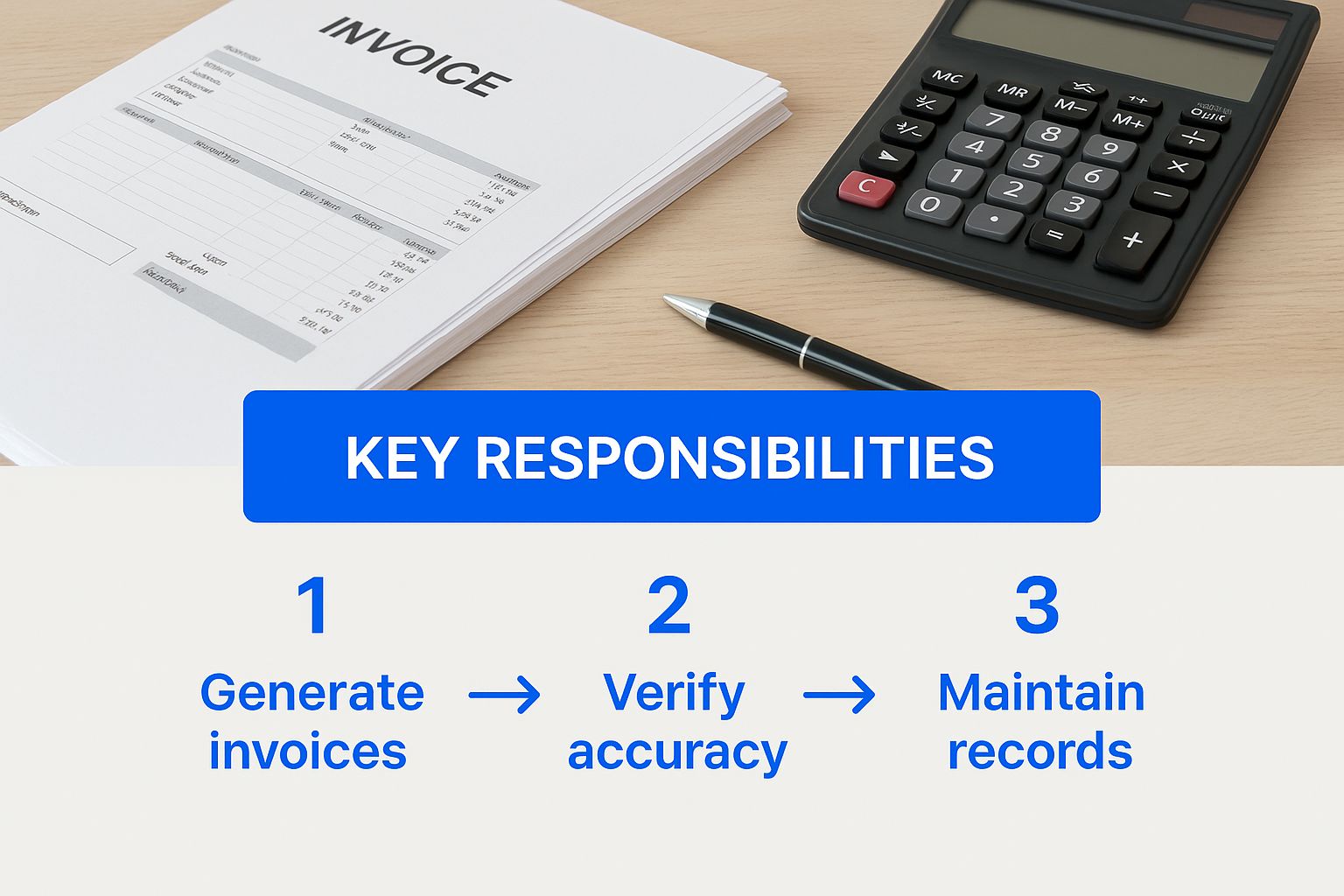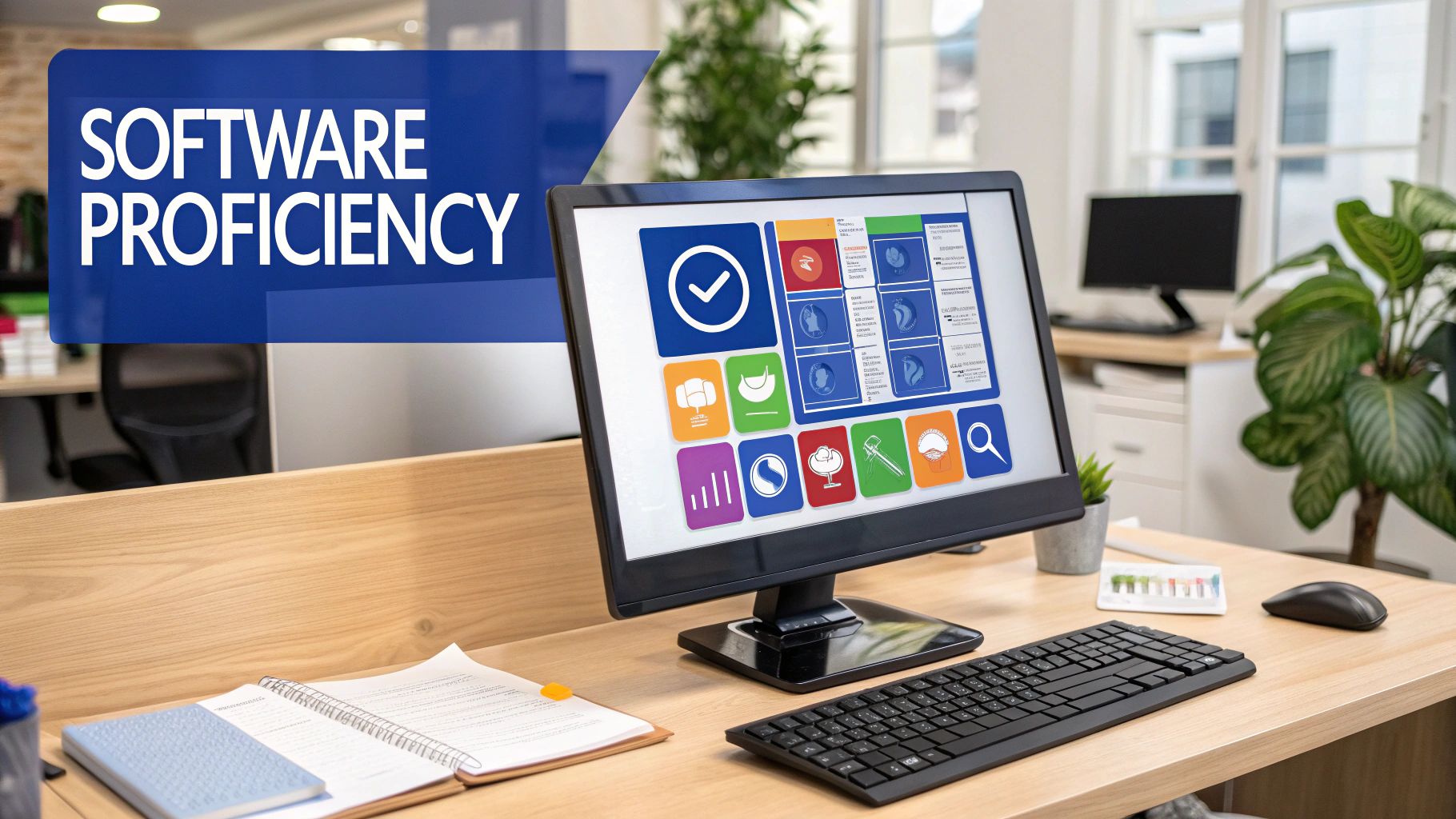An accounts payable job description is much more than a simple list of tasks. It's your first conversation with a potential new hire, setting the stage for who you are as a company and what you truly value in your finance team. To attract the best people, it needs to be specific, detailed, and give a real sense of the role's impact on your business's efficiency.
Why Generic AP Job Descriptions Don't Work
Let’s be honest. Most AP job descriptions out there are dull, recycled documents. They’re full of vague phrases like "process invoices" or "manage vendor payments" that tell a candidate next to nothing about what the job is really like. This copy-and-paste approach is a massive misstep, especially in today's competitive hiring market.
When you post a bland description, you're essentially putting out a welcome mat for a wave of mismatched or uninspired applications. The real gems—the AP professionals with sharp skills in specific ERP systems or experience handling complex multi-currency transactions—will simply scroll on by. They’re searching for a role where they can make a genuine difference, not just punch a clock.
Think of your job description as your most powerful recruitment marketing tool. It’s not just an administrative formality; it's your first, and arguably most important, chance to sell the role to the right person.
A strong description digs deeper than just the daily to-do list. For instance, generic templates often fail to mention how the role drives bigger improvements, like spearheading efforts in automating accounts payable processes. Including this kind of detail shows candidates they’ll be joining a forward-thinking team that values innovation.
The AP function has evolved. It’s no longer just about data entry. Today’s role demands sharp analytical skills, an almost obsessive attention to detail, and the confidence to handle supplier negotiations. Vague descriptions do a real disservice to this complexity and won't attract candidates who possess these vital skills.
This is even more critical in the current economic climate. With growing competition for every open position, you need to stand out. In the UK, the unemployment-to-vacancy ratio climbed to 2.2 job seekers for every vacancy by March 2025. While this means there are more people looking for work, the most talented professionals are more selective than ever. You can read more on the latest UK job market trends in the latest official reports.
Building the Core of Your Job Description
The real work in writing a great accounts payable job description is getting the details right. It all starts with the job title. From my experience, a title like ‘Accounts Payable Specialist’ tends to draw in candidates with stronger analytical skills and a bit more experience under their belts. On the other hand, ‘Accounts Payable Clerk’ often attracts people whose strengths lie in efficient processing and data entry. Think carefully about what you truly need and pick the title that fits.
Next up is the job summary. This is your first real chance to sell the role. Don't just list tasks. Instead, tell a short story about the position's purpose. Explain how this person's work directly impacts the company's financial stability. You want to frame it not as just another admin job, but as a vital part of the team's success.
Detailing Daily Responsibilities with Precision
This is where you need to get granular. A vague phrase like "process invoices" is practically useless. It tells a candidate nothing about the volume, the complexity, or the specific software they’ll be using every day.
To give applicants a genuine feel for the role, you have to add specifics. Using numbers and naming the tools you use makes a world of difference. This level of detail doesn't just attract better-suited candidates; it also encourages those who aren't a good fit to self-select out, saving you a lot of time in the long run.
Here’s how you can add that crucial detail:
- Instead of "manage supplier invoices," try: "Process and manage a portfolio of over 150 multi-currency supplier invoices weekly."
- Instead of just mentioning software, be specific: "Reconcile vendor statements and resolve discrepancies using Oracle NetSuite."
- Instead of "assist with month-end," describe the actual contribution: "Lead the reconciliation of three key corporate credit card accounts to support a timely month-end close."
The infographic below really helps visualise how to frame these responsibilities, giving you a template for a description that offers a true preview of the job's daily rhythm.

When putting your job description together, it's helpful to think about the cadence of the work. Breaking tasks down by frequency—daily, weekly, and monthly—gives candidates a clear, structured view of what to expect.
Here's a breakdown you can adapt for your own needs:
Key Responsibilities Breakdown for an AP Role
This kind of structure shows you’ve thought through the role properly and sets clear expectations from the outset.
A great job description is a day-in-the-life preview. It should give a candidate enough information to realistically imagine themselves performing the job, tackling its challenges, and succeeding in the role.
Ultimately, by getting this core section right, your job description becomes more than just an advertisement—it becomes your most effective screening tool. It ensures the people who apply not only have the necessary skills but also a realistic understanding of what you need from them on day one. That clarity is the foundation of any successful hire.
Pinpointing the Right Skills and Qualifications

Once you've outlined the day-to-day duties, the next step is to define the skills that will make someone truly successful in the role. I’ve seen too many job descriptions fall into the trap of creating a massive, intimidating list of "essential" skills. This is a sure-fire way to put off excellent candidates who might be missing just one or two things from your wishlist.
The trick is to be crystal clear about what’s non-negotiable versus what’s simply a ‘nice-to-have’. This small change can dramatically widen your talent pool. For example, being adept with your company’s core ERP system, whether that's SAP or Xero, is likely a must-have. Experience with a secondary bit of software, though? That’s probably a preference. Make that distinction obvious.
Essential Hard and Soft Skills
When detailing hard skills, get specific. Don't just say "proficient in Excel." What does that actually mean? A far better approach is to state precisely what you need, such as, "advanced proficiency in Microsoft Excel, including VLOOKUPs, pivot tables, and SUMIF functions." This leaves no room for ambiguity and tells a candidate exactly what they'll need to do.
But let's be honest, the hard skills are only half the story. The soft skills are what truly separate a decent accounts payable professional from a great one. These are the personal attributes that determine how they'll fit into your team and cope with the inevitable pressures of the job.
You'll want to highlight qualities like:
- Meticulous Attention to Detail: This is fundamental for catching invoice errors or spotting a duplicate payment before it causes a headache.
- Confident Communication: Absolutely vital for negotiating with suppliers over payment terms or professionally handling discrepancies.
- Proactive Problem-Solving: You need someone who can take the initiative to investigate and resolve payment issues on their own.
- Adaptability to New Technology: To attract forward-thinking talent, you should emphasise the need to understand and work with tools like accounts payable automation.
A candidate can always learn a new piece of software, but it's much harder to teach genuine curiosity or a naturally meticulous mindset. I always recommend prioritising the soft skills that signal a strong cultural fit and a proactive approach. The specific qualifications for finance roles can vary, much like they do for other positions, which you can see in our guide on financial analyst job requirements.
This balanced approach is more important than ever. In 2025, the UK recruitment market for finance roles is facing some unique pressures, including a contracting job market and heightened wage competition. In this environment, you need professionals who not only have the technical know-how but are also eager to adopt new technologies to drive efficiency.
Setting a Competitive Salary and Benefits Package

Let’s be honest, nothing puts a good candidate off faster than a job advert with no salary information. It's a classic mistake. Being upfront with a clear salary range from the start shows you respect their time and that you’re a straightforward employer. It immediately filters for people who are a good fit and saves everyone a lot of hassle down the line.
So, how do you land on the right number? It starts with a bit of homework. You need to get a feel for the current market rates for accounts payable roles, but don’t just look at national averages. Dig deeper into what’s competitive for your specific city or region, the seniority of this particular role, and the size of your company.
The data above gives a pretty solid benchmark for the UK. As of May 2025, the median annual salary for an Accounts Payable professional was £57,500. Interestingly, the numbers show that even outside of London, the median salary stays quite strong, which tells you that demand is consistent across the country. For a closer look, you can always explore detailed salary trends for AP roles on ITJobsWatch.co.uk. This sort of insight is gold when you're trying to position your offer effectively.
Looking Beyond the Pay Cheque
While a strong salary will get people’s attention, it’s often the benefits package that seals the deal. I’ve seen it happen time and again: a slightly lower salary with an amazing benefits package will beat a higher offer with a lacklustre one. It’s the total value you’re offering that really counts.
Think about what truly makes your company a great place to work. Do you go above and beyond the basics?
- A generous pension contribution?
- More holiday allowance than the statutory minimum?
- Support for professional qualifications like the AAT?
- Flexible or hybrid working arrangements?
A strong benefits package directly communicates your company's investment in its people. It's a crucial part of the story you tell and can significantly influence a candidate's final decision.
When you highlight these perks in your job description, you’re showing that you genuinely care about your team’s well-being and their professional growth. This doesn't just attract the best people; it's also a cornerstone of good employee retention strategies for the long term. Frame your compensation and benefits as a complete, compelling package, and you’ll find it much easier to attract the talent you’re looking for.
Selling Your Company Culture and Vision
Remember, a job description is a two-way street. You're not just filling a vacancy; you're inviting someone to join your team. The best candidates are choosing you just as much as you're choosing them. This is your chance to move beyond a dry list of tasks and really sell the role.
Think of it as a marketing piece for your company. What makes your workplace special? Don't just throw in vague corporate fluff. Talk about what it’s actually like to work in your finance department. Is it a genuinely collaborative environment? Are there clear opportunities for growth, like support for AAT qualifications? Put that front and centre.
The ‘About Us’ section isn't just filler; it’s your best shot at showing candidates why they should be excited to join your team. A brilliant company culture can easily be the deciding factor between two very similar job offers.
Showcasing that you’re a modern, efficient workplace is another huge draw. Mentioning the tools you use shows you respect your team’s time and are invested in making their jobs easier. For example, explicitly stating that you use invoice automation software tells a candidate you’re a forward-thinking company that prefers smart solutions to manual, repetitive work.
What Makes Your Company Unique?
Get specific. Do you offer flexible hours or a hybrid working arrangement? Do you have team lunches or celebrate big wins together? These are the details that paint a picture and help a candidate imagine themselves as part of your team. They aren't just looking for a job; they're looking for a place where they'll feel valued and can do their best work. Give them every reason to choose you.
Right, you've spent all this time crafting the perfect accounts payable job description. It’s clear, compelling, and sets out exactly who you’re looking for. Don't let all that effort go to waste with a clunky application process at the very end.
Think about it from the candidate's perspective. They've just read a great description and are excited to apply, only to be met with a complicated, multi-page questionnaire. It’s an instant turn-off. You'll lose fantastic people at the final hurdle, especially those who are passively looking and not desperate for a move.
A smooth, simple application tells a candidate that you value their time and that your company is efficient and modern. The single best thing you can do? Let them apply with their CV. Forcing someone to manually re-enter their entire career history, especially on a mobile phone, is a surefire way to increase drop-off rates.
Your application process is the final, crucial part of the candidate experience. Make it seamless and respectful of their time. The easier you make it to apply, the more likely top talent will actually complete the process.
Finally, be crystal clear about what happens next. A simple, direct call to action manages expectations and shows you’re an organised, considerate employer. Something as straightforward as, "We review every application and will be in touch within five working days if you’re shortlisted for an interview," makes all the difference. It’s a small touch, but it starts building goodwill right from the beginning.
Navigating the Tricky Questions in AP Job Descriptions
When you sit down to write an accounts payable job description, a few questions always seem to pop up. I’ve seen hiring managers grapple with these time and again, and getting the answers right from the start makes a world of difference in the quality of candidates you attract.
Let's break down some of those common sticking points.
How Long Should It Really Be?
First up, the big one: length. There's no magic number, but from experience, the sweet spot is usually between 400 and 700 words. Any shorter, and you risk being too vague. Any longer, and you'll lose your reader's attention before they even get to the good stuff.
The real goal isn't word count; it's clarity. Your job description should be a clear, compelling snapshot of the role. Use bullet points for duties and skills to make it easy to scan. Think of it less as a formal document and more as a marketing tool designed to help the right people self-select and apply.
Should We Put the Salary on the Advert?
This comes up constantly, and my answer is always a resounding yes. In the current job market, hiding the salary is a major red flag for candidates. Being upfront with a realistic salary range is one of the most effective things you can do.
It sets clear expectations and weeds out applicants who are out of scope, saving everyone a huge amount of time.
Being transparent about compensation isn't just about efficiency. It signals that you're a fair and modern employer, giving you a powerful edge in a crowded talent market.
What are the Biggest Mistakes to Sidestep?
Finally, let's talk about the classic mistakes that can sink an otherwise great job advert. I see these time and time again:
- Vague, Jargon-Filled Language: Avoid using internal company acronyms or overly generic phrases like "assisting the finance team." Be specific. Mention the exact software they'll use and the concrete tasks they will own.
- The Impossible Wishlist: An endless list of "essential" skills is a surefire way to scare off perfectly good candidates. Be realistic and separate the genuine must-haves from the nice-to-haves.
- Forgetting to Sell the Sizzle: Your company culture, the team they'll join, and the opportunities for growth are all major selling points. Don't just list duties; explain why someone would want to do this job at your company.
- A Creative but Invisible Job Title: Using a non-standard title like "Accounts Payable Ninja" might seem fun, but it won't show up in searches. Stick to clear, optimised titles like "Accounts Payable Clerk" or "AP Specialist."
Steering clear of these common pitfalls will help you craft a job description that truly works for you. Of course, writing the advert is only half the battle. When it's time for interviews, you'll need the right questions ready. We've put together some great examples in our guide to essential accounting assistant interview questions.

